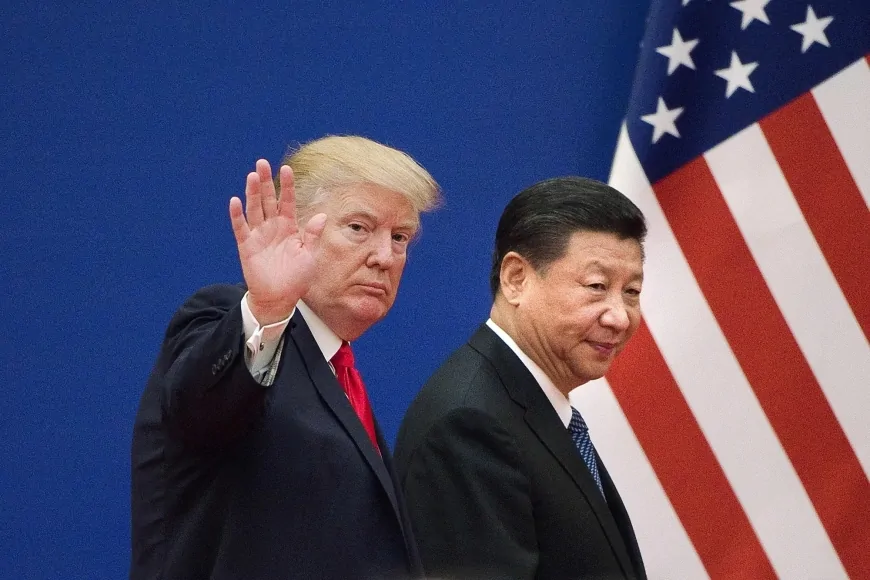Live: Trump Enforces Tariffs on China, Temporarily Suspends Duties on Canada and Mexico
Follow live updates on Trump’s tariffs—duties on China take effect, while Canada and Mexico get a one-month delay. Trade tensions and economic impact unfold.

President Donald Trump is taking a firm stance on trade by imposing tariffs, a tool he has frequently used to influence economic policy.
Over the weekend, he announced that new tariffs would take effect starting Tuesday—placing a 25% duty on imports from Canada and Mexico and a 10% duty on goods from China. However, after discussions with Canadian and Mexican leaders, he agreed to postpone tariffs on those countries for a month.
Also Read: Mexico and Canada Secure Agreement, China Tariffs Set to Begin Tuesday
China, on the other hand, was not granted a delay. The tariffs on Chinese imports were implemented as planned, prompting an immediate response from Beijing. Trump is expected to speak with Chinese President Xi Jinping soon, which could open the door for negotiations.
These trade measures could have wide-reaching effects, not just on U.S. relations with major trade partners, but also on the economy. Higher import costs may contribute to inflation, which in turn could influence the Federal Reserve’s decisions on interest rates in the near future.
Follow Live Updates from here...
Key Moments
- Tariffs on China take effect, prompting immediate retaliation.
- Duties on Canada and Mexico delayed for one month after discussions.
- Trade tensions rise, potentially impacting inflation and interest rates.
- Trump plans talks with Xi Jinping, leaving room for possible negotiations.
-
China Responds to U.S. Tariffs with New Trade Measures
China wasted no time in retaliating after the U.S. imposed a 10% tariff on Chinese imports. Shortly after the tariffs took effect, Chinese President Xi Jinping announced countermeasures, including new tariffs on 80 U.S. products and an antitrust investigation into Google.
Amid rising trade tensions, Trump and Xi are expected to hold a phone call later this week, potentially paving the way for negotiations.
-
Apparel and Footwear Companies Face Growing Risks from Potential Tariffs
Several apparel and footwear brands are preparing for the impact of potential tariffs that could increase costs for both companies and consumers.
Warby Parker (WRBY), known for its eyewear, and Kontoor Brands (KTB), the maker of Wrangler jeans, are among the businesses most vulnerable to tariff changes. While tariffs on Canada and Mexico have yet to take effect, Kontoor sources 30% of its materials from these regions. Warby Parker, on the other hand, imports 20% of its products from China.
Footwear brands such as Skechers (SKX) and Crocs (CROX) are also significantly exposed, with 40% and 28% of their products, respectively, coming from China. The implementation of tariffs could lead to increased costs for these companies, which might eventually be passed on to consumers.
-
Trump Shrugs Off China's Retaliatory Tariffs, Says Talks with Xi Can Wait
President Donald Trump downplayed the impact of China’s retaliatory tariffs on Tuesday, stating that the situation was "fine" and adding that he’s not rushing into talks with Chinese President Xi Jinping to address the ongoing trade tensions.
"We'll talk to him when it's the right time. No hurry," Trump told reporters, contradicting his earlier remarks that he expected to speak with Xi within the next 24 hours. He also avoided speculating on whether future discussions might lead to the removal of tariffs.
The president made these comments after signing new executive orders, following the implementation of a 10% tariff on Chinese goods. In retaliation, China has launched a series of countermeasures, including the potential investigation of companies like Google (GOOG, GOOGL) and Nvidia (NVDA), which could be used as leverage.
Meanwhile, Trump’s proposed 25% tariffs on goods from Canada and Mexico are delayed for a month as talks continue. He also highlighted the positive outcomes from ongoing negotiations, noting the temporary border closure and reinforcing his belief that tariffs are an effective negotiating tool, saying, “We’re making progress with countries that were unexpected.”
-
Canada Expresses Concerns Over Potential Trade War and Future Negotiations with Trump
A last-minute agreement has temporarily alleviated fears of a U.S.-Canada trade war, offering a brief moment of relief for investors. However, Canadian leaders are expressing deep concerns about the crucial negotiations set to take place in the coming weeks.
The deal only postponed the tariff threat for 30 days, with President Trump indicating that the next month would be used to determine if a comprehensive economic agreement with Canada can be established.
As long as the potential for tariffs remains, Canadian economists, business leaders, and government officials are increasingly worried that the looming uncertainty could drive investments away to the U.S.
David Eby, Premier of British Columbia, strongly criticized Trump's tactics, suggesting they were intentionally aimed at weakening Canada's economy and pushing the country toward becoming part of the U.S. “It’s a strategy that is both harmful and confusing,” Eby stated, calling the situation “profoundly upsetting” and sparking anger among Canadians who feel they understand the underlying motives of the negotiations.
-
Stocks Gain as U.S. Tariffs Begin, China Responds with Countermeasures
U.S. stocks ended the day on a positive note Tuesday, despite the implementation of a new 10% tariff on Chinese goods, with China retaliating in kind.
The Dow Jones Industrial Average (^DJI) edged up by around 0.3%, while the S&P 500 (^GSPC) climbed approximately 0.7%. The Nasdaq Composite (^IXIC) experienced a notable rally of nearly 1.4%, making up for some of the losses from the previous day. The U.S. dollar index (DX-Y.NYB) dropped 0.9%, as investor anxiety diminished.
Although President Trump did not engage in talks with Chinese President Xi Jinping on Tuesday, a conversation is expected later in the week.
Along with the tariff reprisals, China launched an investigation into Google (GOOG, GOOGL) for antitrust concerns and added U.S. companies PVH (owner of Calvin Klein) and Illumina (ILMN) to its list of “unreliable entities.”
-
Trump’s Tariff Changes Target Fast Fashion Giants Temu and Shein by Closing Key Loophole
Fast-fashion platforms like Temu and Shein are facing a major challenge as President Trump’s new tariffs close a loophole that has given them a competitive advantage. The U.S. government has decided to end the de minimis exemption, which previously allowed imported goods valued under $800 to enter the country without tariffs.
This exemption has been a significant factor in the explosive growth of Chinese-based online retailers, enabling them to ship a wide range of products—from discounted fashion to electronics—directly to U.S. consumers without incurring duties.
The surge in their growth was accelerated by a 2016 policy change that raised the duty-free limit from $200 to $800. As a result, the volume of duty-free shipments entering the U.S. skyrocketed, increasing from 139 million in 2015 to a projected 1.36 billion by 2024, now making up about 90% of total imports, as reported by U.S. Customs and Border Protection.
This rapid influx of goods has drawn criticism from American manufacturers and retailers, who believe the exemption allows foreign companies an unfair advantage. In response, Amazon (AMZN) has tried to compete by developing its own marketplace for direct shipments from China, but the effort has been met with mixed reactions.





































































